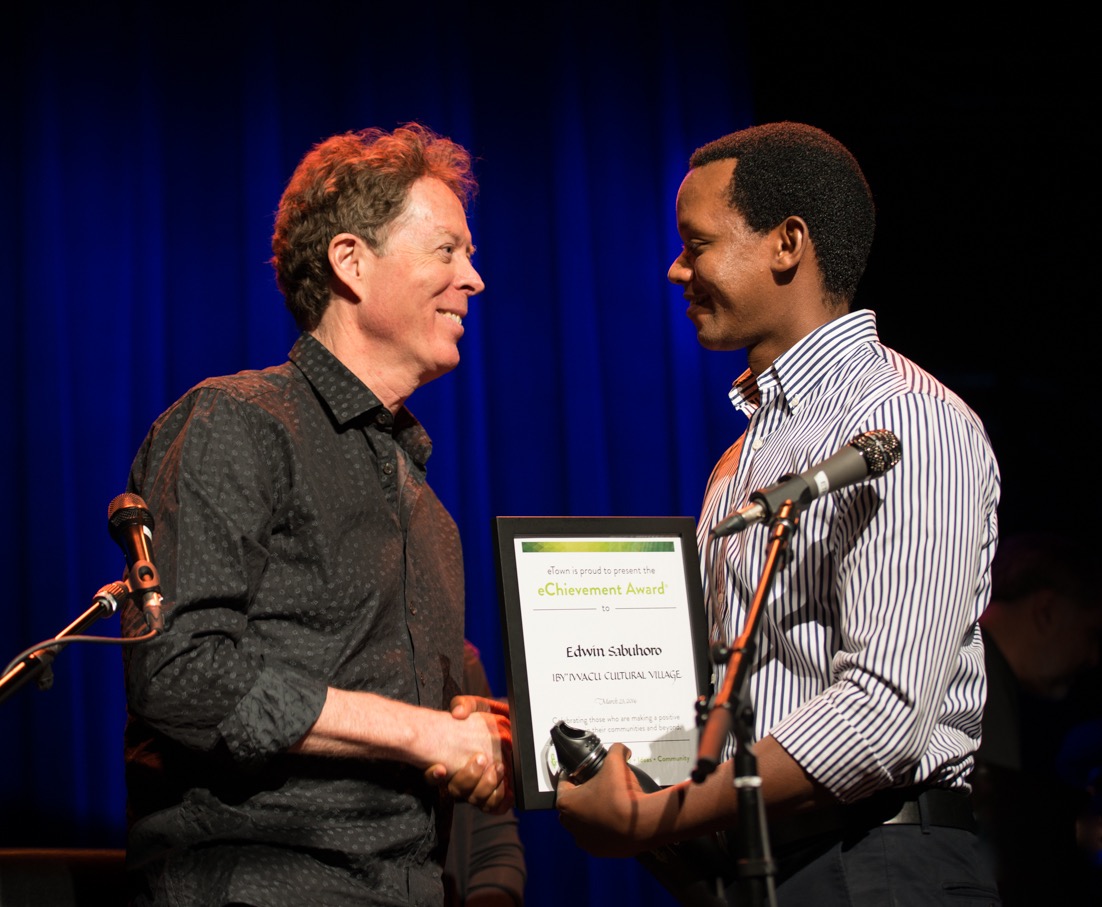Edwin Sabuhuro – Iby’Iwacu Cultural Village
One Man's Quest to Save the Gorilla
By Lauren Price, Katy Canada, Roni Dengler https://vimeo.com/165519123 Deep in the Rwandan jungle, a park ranger disguised as a buyer in the illegal market for endangered primates felt tears stinging his eyes the second he spotted a battered, malnourished baby gorilla tied up in a sack. Well aware that the poachers who escorted him through miles of dense forest would kill him like they did the baby’s parents if they discovered his ruse, Edwin Sabuhoro lied. “I said it was because I was seeing my product for the first time,” he said, looking back on the harrowing experience 16 years later. That was the first time the 24-year old saved a life. It was a turning point in his mission to protect Rwanda’s mountain gorilla population. “I felt so good about myself that I had saved a baby gorilla,” Sabuhoro said. But he regretted the fact that the poachers, who must kill or sell the endangered gorillas to live, were arrested for their actions. They will spend the rest of their days behind bars. It dawned on Sabuhoro that to protect the highly prized animals, he would have to prove that they’re more valuable alive than dead. The beginning Sabuhoro first locked eyes with a mountain gorilla when he was 24. He said it was like looking into the face of a human. “The first time when I looked at them I got a sense of something that I couldn't define,” he said. “Seeing them right there looking at me and knowing where they live, I felt something in me that pulled me toward the work that I ended up doing.” Sabuhoro took a position as a ranger in Volcanoes National Park to learn more about mountain gorillas. But his enthusiasm for the park was shattered by the discovery of illegal gorilla poaching. That’s how he found himself posing as a gorilla buyer, doing what it took to catch the poachers in the act. Mountain gorillas roam the jungle with a target on their backs for a number of reasons. They’re sought out by wealthy buyers who want to domesticate the wild primates. A baby gorilla is worth around $2,000 in a country where annual per capita income is $718 dollars. The gorilla trade is a risky business. Poachers who get caught in the act face severe legal repercussions, ranging from fines to imprisonment. But many have no other choice. Poachers, who may not actually want to engage in the annihilation of a dwindling species, must choose between watching their families starve and wiping out prized wildlife populations. “If you don’t provide for your family, then you’re not a man,” he said. “Because of that social pressure from the family, you have to go out and kill wildlife so you can feed your family.” The cultural and economic realities of surviving in Rwanda, along with habitat loss and widespread disease, have left mountain gorillas critically endangered. Fewer than 900 remain in the world. The solution Disenchanted with the realities of poaching in Rwanda’s national parks, Sabuhoro left his post in pursuit of a solution that would reverse the population decline, starting with the people responsible for hunting or selling gorillas. In trying to understand the poachers’ motives, Sabuhoro conceived a more effective solution, one that both saves the lives of gorillas and supports families that would be devastated if their husbands and fathers were sent to prison. He started by connecting with the locals who were pigeonholed by an economic burden into the poaching business. He began teaching poachers and their families useful, nonviolent skills, like crafting, painting and woodworking, which would help them earn money without having to kill. The reformed poachers now sell fruits of their labor to tourists. The more he earned their trust, the more willing they were to step away from a career poaching. Sabuhoro also funded the education of five ex-hunters, who have now graduated and begun promoting conservation in their own villages. “We need to take care of local people,” he said. “Then the local people will take care of local wildlife. Until we put it in the hands of people around them, we cannot save [gorillas].” As a result of his work, he said, many have access to health care and savings of up to $2,000. “I’ve been able to see a change,” he said. “They’re calling them my gorillas — my pack.” Looking forward The number of mountain gorillas in Rwanda has been on the rise since Sabuhoro began his work. The country’s forest canopy welcomes 20 baby gorillas annually. That doesn’t mean his work is done. While Sabuhoro pursues a Ph.D. in parks, recreation and tourism at Clemson University, the former poachers he trained to advocate for gorillas and empower communities have stepped in to fill his responsibilities — that way the operation continues to give back to the people driving progress and the animals they protect. “When I’m not there they run everything,” he said. “So they have the expertise, they know how we started, they know what we have been doing and they can teach others. That’s the contract between them and me.” Sabuhoro will use his degree to expand his program in Rwanda. He said his model for protecting endangered wildlife can be applied in other communities around Africa to benefit other species, including elephants and rhinos. “What I’m trying to do now is connect with this kind of work in other regions,” he said. “You can never retire when the threat is still on.”